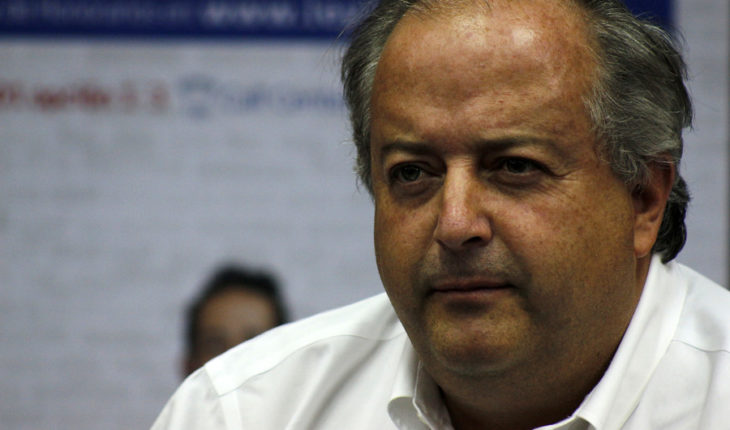Nicolás Monckeberg A few years ago it ceased to be the promise Of the renovation of the centre of the Decade of the 2000. The youngest congressman, named one of the hundred leaders of the country, departed as an electoral machine, after in 2010 broke the dubbing of the concertation and managed to be elected to the Chamber of Deputies for Cerro Navia, Lo Prado and Quinta Normal. A triumph that catapulted him as one of the key men on the right, although he never managed to beat Congresswoman Cristina Girardi (PPD) in the district, a pain that weighs him until today, according to his close.
He spent almost twenty years in Congress, where he invested a good part of his time in the Labour committee, so nobody was surprised that President Sebastián Piñera left him in charge of the Ministry of the area in his second term. In the palace they emphasize that it has “direct line” with the president, so much so that it has often skipped the intermediation of the Minister Gonzalo Blumel and the chief of the second floor, Cristián Larroulet.
Although in the currency they qualified with good note their first year as a minister, in the interior of the official recognize that it did not emphasize, neither for good nor for bad, but that it was “Parejito”. This siege, of little public figuration, could hardly be broken by the conflict that it maintained with the eventual workers of the port of Valparaiso and the controversy by its rickety appearance at the 45 years. Of projects was not seen much, as reforms to the pension system and Labor flexibilization were kicked over and over again by the executive for processing.
The 2019 started different, the minister has achieved cover headlines, “Something he likes very much,” jokes a parliamentarian close to Monckeberg. “Nico” – as his friends call him – has been in the spotlight with pension and labor reforms, but not necessarily as he expected. In an interview on Radio La Clave, the minister stressed that if a worker, “instead of 9 in the morning arrives at 07:30, it will take 20 minutes to hit and will get home for at least an hour and a half before , because he’s not going to go to taco time. ”
The phrase was rebutted on the spot by journalist Fernando Paulsen and Minister Monckeberg corrected his sayings: “If there were to be a number of working days, there would be much less likelihood of them concentrating at the same time.” But their rectification was not enough and the networks were filled with criticisms and memes with the Minister teleporting.
It was a “complex” moment, they recognize from the ministerial circle of Monckeberg. His communication planning to launch one of the star projects of the portfolio of work and Social welfare, with that intervention, went directly to the trash jar. Such was the concern of the minister, who himself called on various media outlets and contacted the journalists who were writing the news, in order to explain their statements.
Another conflicting moment for “El Nico” was the process of the reform project to the pension system. The rejection of deputy DC Raul Soto, in the Committee on the work of the Chamber, generated a hurricane within the government, which took for granted the support of the phalanx to the idea of legislating. The task of the negotiation was of the ministers Larraín, Blumel and Monckeberg, who would have made a “irrechazable” proposal to Soto, according to a parliamentarian from Chile Vamos. Soto did not relent and rejected the proposal in the Committee and in the room, where the idea of legislating with the votes of the DC and the Radicals was finally approved.
But the TV series did not end there, despite the happiness after the approval in general of the project, the Minister of Finance Hernán Larraín sowed the chaos, noting that “not necessarily” a public entity would administer the 4% extra for the system of capitalization el individuo, la individua.
Such statements caused a profound annoyance, as they were totally against what was agreed with Christian Democracy, which demanded that the state administer those resources.
In an interview with the counter, the owner of the work dropped the profile of the conflict and stressed that in the reform there is no small letter and reinforced the idea that 4% was administered by a State entity. This point of reform would be their authorship, as it was not included in the original government program.
This way of working, motivated by the own agenda, according to the collaborators, can be seen in other projects of the law. The permanent search for emphasis would have led it to propose legislative initiatives unilaterally and without a technical basis.
One of these projects was the “Law of Works or slaughters”, which was not in the program of Sebastián Piñera and that was carried out only because it was a parliamentary motion that counted on its rubric of its period of deputy. In a headache it became also the project of compensation for years of service, an initiative that, like the 4% extra and the Works Act, also did not contemplate the program of the current president, but that – according to an exadviser of the time – Monckeberg “La Impu Lsó only because he once told a journalist in an interview and did not dare to say it was a mistake and, in his personal attempt, embarked on the entire government. ”
These ways of proceeding – recognizes an excollaborator – are commanded by one of their main weaknesses: their eagerness to appear before the cameras and capture the attention of the press. “He enjoys it very much,” they say. For this reason is that the prominence reached by the Minister of Transport, Gloria Hutt, in the midst of unemployment of the eventual workers of the port in Valparaiso, would have aroused the annoyance in Monckeberg.
The idea was for the minister to take care of the workers, while Hutt contained the businessmen, especially the Von Appen family, but Paul Klimpel recalls that the negotiating tables were always both ministers or their advisers. This joint effort, however, was not reflected in communications revenue for Monckeberg and, indeed, the Hutt minister was the one who managed to capitalize on the end of the conflict and soared in the polls, even sounding as a possible presidential candidate. Other secretaries of state with whom it would have clashed with the attention of the press in conferences, would be the ministers Isabel Plá and Cecilia Perez and the Minister Alfredo Moreno.
An excollaborator points out that Monckeberg has a personality “Acaballada” and that his reactions “are of despair when he sees diminished its protagonism. It tends to present projects without participation and is handled in them with secrecy. ”
The chief
If there is one thing that all of your collaborators and outworkers agree on is that Nicholas Monckeberg is obsessive with work. Journalist Ángeles Noudón has been working with him for years, currently serves as the minister’s external advisor and stresses that “working with Nicholas is a challenge for the good. You have to learn to keep pace with him, because he’s a smart, demanding, thorough boss who doesn’t neglect practically any detail. At the same time, he recognizes the good ideas of others and thanks them. ”
The workaholic character makes your computer always “a full”. A labor and time load that has led to the generation of different rotations in your portfolio, mainly in the area of communications.
At the end of last year, the departure of a consultant and two press leaders, Marcela Doll and Andrea Hasbún, drew attention. The latter works currently works in the National Chamber of Commerce (CNC), which caught the attention of the business world, as the Ministry of Labour and Social Welfare has been confronted with the TNC by the unemployment figures.
In explaining why he left his work in the ministry, Hasbún points out why it was not “so easy to reconcile it with the demands of my personal and family life.” He stressed that it was “a hit that I was very entertained and where I had a good time” and that has the best memories of the minister, who is “a hardworking and intense, but close”.
The story of Marcela Doll, a renowned journalist in the centre, appears to be another. He arrived in March to the ministry and was only two months in the communications Headquarters.
The journalist would never have met with Monckeberg, which unleashed strong differences of opinion between the two. In the ministry they remember that their relationship “was tense”, because “the minister does not know how to receive recommendations.” A government advisor said that even the currency was notified that the journalist had been challenged “screaming” by the minister, which is why he was transferred to the Sence, although there would receive a million pesos less pay.
From the circle of Monckeberg they say that the relationship of both did not flow, but that there was never a shouting or mistreatment by the minister. They add that she was transferred to the Sence, where someone with experience was needed, due to the change in the structure of the service. The counter contacted Doll, but received no answer.
Another name that attracted the attention is that of Sergio Morales, lawyer of the Institute freedom and Development that came with bombons and cymbals to advise the minister and the undersecretary, but that in September it moved to the direction of the work. His change generated noise inside the ministry because his access to the team had been compromised. Morales explains that his change was discussed with Minister Monckeberg and that he offered to “take on the issue of minimum services in the direction of work, because we consider it a key issue and needed support.”
Among the advisors who work for the government, Monckeberg is recognized as one of the “fatal bosses, always wants everything for yesterday.” So much so that every time QEU has a press guideline, at the hour after is tracking their appearances and is obfuscated if another minister or minister appears more than him in the media. They emphasize that it has a “light genius”, “the chuchá in the tip of the tongue” and that on several occasions “sparks the fingers” to accelerate the work.
In Congress they remember him as a “very nice man, Dicharachero and kind”, but that is transformed when he gets angry, he is like a “farm pattern”. Position that has generated various conflicts with his subordinates, including his workers while he was a member. Its vast networks in Congress do, however, that few dare to speak on the subject openly.
A conflicting point for his administration was the process of layoffs when the government started. On April 19, 2018, the Chief of Staff of the minister, Andrea Mackenney, quoted a number of officials to notify them of their dismissals “by necessity” of the employer. In the past, officials hired in the Michelle Bachelet administration were dismissed, but also some historical ministry workers. At the meeting, Mackenney urged the officials to sign a letter of voluntary resignation, as reported by those affected in a series of allegations of unjustified dismissal. Only a worker signed.
One such case is that of the Exsubsecretario journalist Francisco Javier Díaz, who in January of this year won a trial in the second court of letters in Santiago, which sentenced the Treasury to pay more than $36 million, resolution to which appealed the Defense Council of the State (CDE), according to the third. From the ministry they emphasize that all those causes were failed in favor of the state and that only one remains in process, but that still do not have results.
According to those affected, Minister Nicolás Monckeberg was never willing to talk to them, he did not even agree to have a meeting with the dismissed or the management of the work, who helped them. What’s more, one of his legislative advisers informed them that the Secretary of State had no interest in taking the issue of layoffs in the portfolio.
Negotiator Dicharachero
Minister Nicolás Monckeberg is a folksy “good for size”, is not afraid of ridicule and, as mentioned in this report, has some weakness for the cameras, so much so that he did not care to burn the dinner prepared for the program “The Divine Food” , from Chilevisión. His fanaticism for the Colo Colo is sincere, he likes a good barbecue and karaoke with the songs of Zalo Reyes, “You know all,” notes Maria Ángeles Naudon.
After returning from his studies at Harvard, the Minister of Labor decided to dabble in politics, following in the footsteps of his grandfather Gustavo Monckeberg Barros, former member of RN. He was a young councilman from Santiago and then became a deputy. Inside the RN’s bench stood out immediately. It had a great capacity of management, remember it always looking for agreements, “but in truth it weaving nets”, emphasizes a parliamentarian of the Committee of work. They also remember him for having extensive days in Congress and staying until late at night working, “that of extending the working day, not surprised me, he can have for more than twelve hours working on his team,” adds an exadviser of Parliament.
The facet of the Monckeberg agreements is not known to all members of the Working Committee. They emphasize that the undersecretaries Fernando Arab and María José Zaldívar are those that have more presence in this Committee and that the Minister does not manage well the details of the projects. He “moves more by the affective side”, tries to become friends with the deputies and “arrives by the good wave” and “is well-told”, stand out from the Commission.
“The minister has pointed out that he has the will to work and dialogue with the different sectors, but in each of the projects we have not seen him. In the projects of the Young Labor statute, teleworking and pension reform has maintained a closed stance, not available to dialogue, but to impose a highly ideological agenda, “said Congresswoman Gael Yeomans (FA).
But the minister likes to fight the projects to the end and insists on the circle of trust he built during his years as a parliamentarian. There, its main allies would be Deputy Tucapel Jiménez (PPD), Senator Carolina Goic and Deputy Patricio Walker (DC). But in the reform of the pension system, according to Congresswoman Yeomans, called “the attention that the Minister of Labour, often, had less preponderance than what was marking the agenda of the Minister of Finance”, a fact that was noticed by the official and the opposition In Congress.
In another sector where the minister does not have a very good arrival is in Sanhattan and among the union leaders. The truth is that they do not know much or have a direct line with them and has always been seen more as a politician than a negotiator. A former collaborator of the Secretary of State emphasizes that “there is distrust in the business and trade union world, of the highest level, with regard to its way of acting. There are several people who do not want or have not wanted to work with him because they find that he has no limits in his personal zeal of protagonism. ”
The latest controversy has to do with his exadviser, Bernardo Ramírez, OTIC of the Chilean Chamber of Construction (CChC), who joined as an advisor to the government portfolio to develop the reform to Sence.
Once the project was completed, Ramírez returned to the CChC, the main intermediary agency that capitalizes the millionaire franchises of the national Training Service. He is accused of elaborating for Monckeberg legislation tailored to the most powerful guild in the country, although the minister’s public discourse is that the reform of the Sence works for the benefit of SMEs.
Despite its sweeping character and its particular way of approaching the Bills, Minister Nicolás Monckeberg would have the only requirement to stay in his portfolio: the confidence of President Sebastián Piñera.





